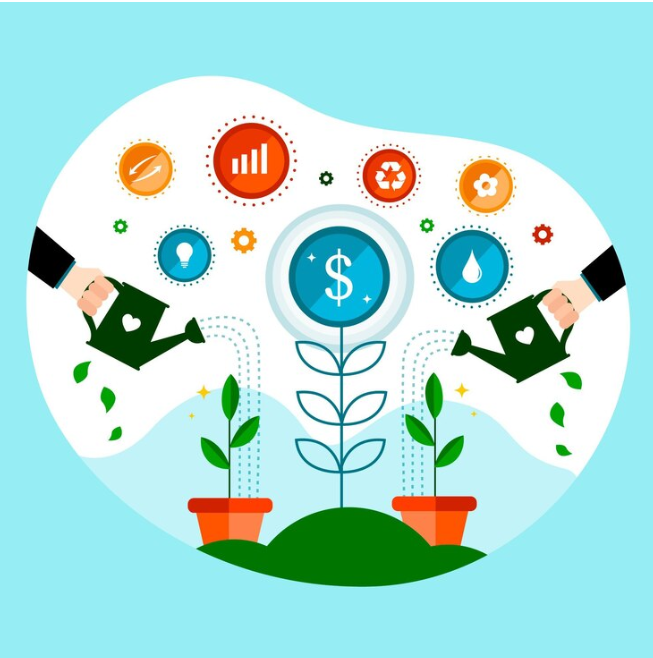In today’s fast-paced and ever-changing job market, achieving financial success is often closely linked with building a sustainable and fulfilling career. For job seekers and professionals alike, the goal is not just to find a job, but to cultivate a career path that ensures long-term financial stability and growth. Here’s an in-depth exploration of how you can achieve financial success through a sustainable career.
Understanding the Concept of a Sustainable Career
A sustainable career is one that is not only financially rewarding but also aligns with your skills, interests, and values. It's about building a career that can withstand economic fluctuations and industry changes while providing continuous opportunities for growth and satisfaction.
1. Identify Your Strengths and Passions
Start by identifying your core strengths and areas you are passionate about. A career built on what you excel at and enjoy doing is more likely to be fulfilling and sustainable. Assess your skills, interests, and values to find a career path that suits you best.
2. Embrace Continuous Learning
In a world where new technologies and methodologies are constantly emerging, continuous learning is key to a sustainable career. Stay updated with industry trends, and invest in upgrading your skills through courses, workshops, and certifications. This not only enhances your employability but also positions you for higher-paying roles.
3. Cultivate a Diverse Skill Set
Diversifying your skill set makes you more adaptable and valuable in the job market. In addition to deepening your expertise in your chosen field, develop skills that are transferable across different roles and industries, such as digital literacy, communication, and problem-solving.
4. Build a Strong Professional Network
Networking is a powerful tool in career development. Build and maintain relationships with colleagues, industry peers, mentors, and alumni. A robust network can provide support, advice, and access to job opportunities that might not be publicly advertised.
5. Prioritize Financial Planning
Financial success requires not just earning well but also managing your finances wisely. Create a budget, save a portion of your income regularly, and invest wisely. Consider consulting a financial advisor to help plan for long-term financial goals, including retirement.
6. Seek Work-Life Balance
Sustainability also involves balancing your professional and personal life. A career that allows for a healthy work-life balance is more likely to be fulfilling and less prone to burnout. Seek employers and roles that value and support this balance.
7. Be Open to Change and Adaptability
Be open to change and willing to adapt. This might mean changing roles, companies, or even industries throughout your career. Flexibility and adaptability are crucial in staying relevant and financially successful in a dynamic job market.
8. Set Clear Career Goals
Set short-term and long-term career goals. These should be specific, measurable, achievable, relevant, and time-bound (SMART). Regularly review and adjust these goals as needed to align with your evolving career path and financial objectives.
9. Opt for Roles with Growth Potential
Choose roles and companies that offer opportunities for growth and advancement. Positions that offer the potential for skill development, promotions, and financial growth contribute to a sustainable and financially successful career.
10. Advocate for Yourself
Don’t shy away from negotiating your salary and benefits. Research industry salary standards and be prepared to advocate for yourself during job offers and performance reviews. Knowing your worth and communicating it effectively is key to financial success.
11. Consider Entrepreneurial Ventures
If suitable, explore entrepreneurial ventures or side hustles. This can not only provide additional income but also diversify your career portfolio, making it more resilient to market changes.
12. Emphasize Work Quality and Professionalism
Maintaining a high standard of work and professionalism can lead to recognition and advancement. Consistently delivering quality work, meeting deadlines, and exhibiting professional behavior can set you apart in your career.
13. Stay Health Conscious
Physical and mental health significantly impact your ability to perform and advance in your career. Invest in your health through regular exercise, a balanced diet, and mindfulness practices. A healthy individual is more productive and better positioned for career success.
14. Leverage Technology
In an increasingly digital world, leveraging technology can streamline work processes, enhance productivity, and open up new career opportunities. Stay abreast of technological advancements relevant to your field.
15. Reflect and Reassess Regularly
Regularly reflect on your career path. Are you moving towards your financial and professional goals? Are you satisfied with your work? This reflection allows you to make necessary adjustments to stay on track for a sustainable and financially successful career.
Conclusion
Achieving financial success through a sustainable career requires a combination of strategic planning, continuous learning, adaptability, and financial management. It's about making informed decisions that align with your long-term career and financial goals. By cultivating a career that is both fulfilling and adaptable to market changes, you set the stage for not just immediate financial gains, but long-term financial stability and growth. Remember, a sustainable career is a journey, not a destination, and it requires ongoing effort and commitment.





